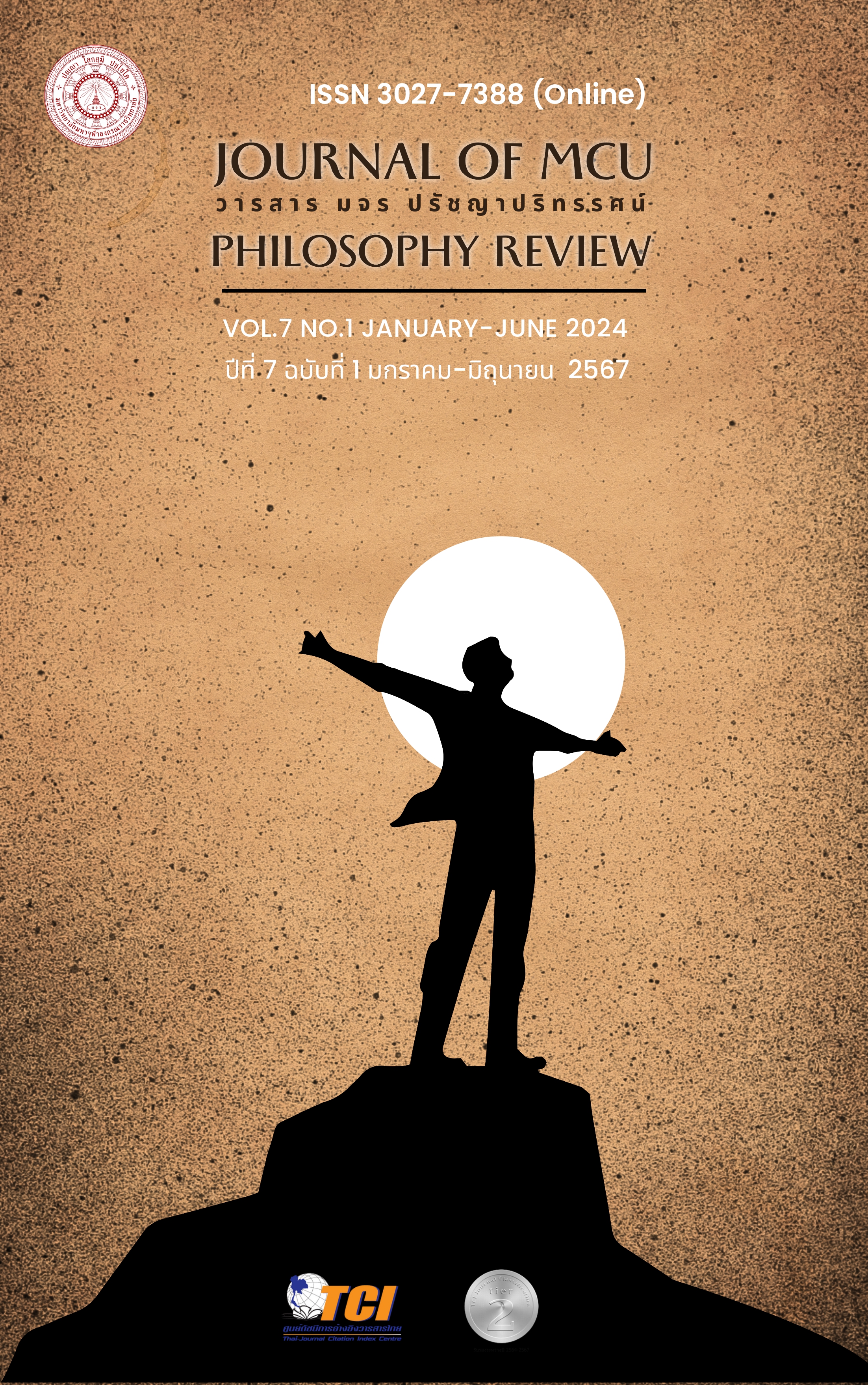The Role of Loving Kindness as a Tool for Improving Quality of life
Main Article Content
Abstract
This academic paper attempts to study the role of Loving Kindness as a supplement for improving quality of life. It is the studies of the numerous documents, including the Tripitaka, Commentaries, and also in Thai and English Texts. The results were found that: The principle of loving-kindness (Metta) in the Sutta. It is a principle that the Buddha taught in giving love to all beings in the world. To be a supplement to improve the quality of life. It is divided into 3 parts: 1) The meaning and goal of loving-kindness (Metta) due to the kindness in various religions in this world, there are focusing on making humans loved, good wishes for each other to live together peacefully. Metta is therefore a universal principle to prevent exploitation in society. The principle of loving-kindness in Buddhism, therefore, has an important meaning and goal, which is to create love and good wishes with a pure heart in living life, is being free from passion, lust, and prejudice. 2) The meaning and goal of quality-of-life development is the need for change to insight the good things occurred in life or society. The “Development” means the process of increasing people’s ability to improve their quality of life. Progress, Security, especially development is essential to the success of individuals and organizations, which is important to individuals present and in the future. 3) Usage of the Love-kindness as a role in improving quality of life, the developing the quality of life according to Buddhist principles, is divided into 4 main categories: moral development, physical development, mental development, and intellectual development. Buddhism is therefore known as a religion that lives with love. Good wishes for each other both in terms of the concepts and methods. The principle of loving-kindness is therefore a basic tool for developing the quality of life and the mind to getting a higher level of morality. Loving-Kindness is therefore a practice that will create value and benefit humans.
Article Details

This work is licensed under a Creative Commons Attribution-NonCommercial-NoDerivatives 4.0 International License.
บทความที่ได้รับการตีพิมพ์เป็นลิขสิทธิ์ของวารสาร มจร ปรัชญาปริทรรศน์
ข้อความในบทความที่ได้รับการตีพิมพ์ในวารสาร ถือเป็นความรับผิดชอบของผู้เขียนบทความ และข้อคิดเห็นนั้นไม่ถือว่าเป็นทัศนะและความรับผิดชอบของกองบรรณาธิการวารสาร มจร ปรัชญาปริทรรศน์
References
มหาจุฬาลงกรณราชวิทยาลัย. (2539). พระไตรปิฎกภาษาไทย ฉบับมหาจุฬาลงกรณราชวิทยาลัย. กรุงเทพมหานคร: โรงพิมพ์มหาจุฬาลงกรณราชวิทยาลัย.
ผกา สัตยธรรม. (2546). คุณธรรมของครู. กรุงเทพมหานคร: จุฬาลงกรณ์มหาวิทยาลัย.
พระธรรมปิฎก (ป.อ. ปยุตฺโต). (2543). พจนานุกรมพุทธศาสตร์ ฉบับประมวลธรรม. กรุงเทพมหานคร: มหาจุฬาลงกรณราชวิทยาลัย.
พระธรรมปิฎก (ป.อ. ปยุตฺโต). (2543). ทศวรรษธรรมทัศน์พระธรรมปิฎกหมวดศึกษาศาสตร์. กรุงเทพมหานคร : ธรรมสภา.
พระธรรมปิฎก (ป.อ.ปยุตฺโต). (2540). ความสำคัญของพระพุทธศาสนา. พิมพ์ครั้งที่9. กรุงเทพมหานคร : มูลนิธิพุทธธรรม.
พระพรหมคุณาภรณ์ (ป.อ. ปยุตฺโต). (2547). บทบาทของพระสงฆ์ในสังคมไทยปัจจุบัน : พุทธศาสนากับสังคมไทย. กรุงเทพมหานคร : รุ่งแสงการพิมพ์.
พระเมธีธรรมาภรณ์ (ประยูร ธมฺมจิตฺโต). (2541). คุณธรรมสำหรับผู้บริหาร. พิมพ์ครั้งที่ 2. กรุงเทพมหานคร : สหธรรมิก.
พระราชวรมุนี (ประยุทธ์ ปยุตฺโต). (2530). การศึกษา : เครื่องมือพัฒนาที่ยังยืน. พัฒนพิมพลักษณ์ : มูลนิธิพุทธธรรม.
สุภาส เครือเนตร. (2541). แนวคิดการพัฒนาคุณภาพชีวิต. กรุงเทพมหานคร : โรงพิมพ์เลี่ยงเชียง.
สมคิด บางโม. (2549). จริยธรรมทางธุรกิจ. กรุงเทพมหานคร : พัฒนวิทย์.
สมบูรณ์ สุขสำราญ. (2544). การพัฒนาชนบทตามแนววิธีพุทธ. กรุงเทพมหานคร : บริษัท พิมพ์สวย จำกัด.
ทิพย์พรรณ นพวงศ์ ณ อยุธยา. (2543). การใช้บทเรียนโมดูล เรื่องค่านิยมที่ส่งเสริมสิ่งแวดล้อมอย่างยั่งยืนสำหรับนักเรียน ระดับชั้นมัธยมศึกษาปีที่ 2. วิทยานิพนธ์ปริญญาการศึกษามหาบัณฑิต. บัณฑิตวิทยาลัย : มหาวิทยาลัยมหิดล.
พระอธิการเวียง กิตฺติวณฺโณ. (2560). เมตตา: ในฐานะเครื่องมือเพื่อความปรองดองแห่งชาติ. วารสารมหาจุฬาคชสาร, 8(2), หน้า 126-137.
อาจศึก งอพา. (2542). “ศึกษาคุณภาพชีวิตการทำงานของข้าราชการตำรวจ อำเภอวัฒนานคร จังหวัดสระแก้ว”. วิทยานิพนธ์ ปริญญาการศึกษามหาบัณฑิต. บัณฑิตวิทยาลัย : มหาวิทยาลัยบูรพา.
The Standard Team. (2565). น้ำใจของคนไทยที่กำลังเหือดหาย ปัญหาจริงขิงสังคมไทยที่หลายคนต้องทำเป็นชิน. สืบค้นเมื่อวันที่ 4 พฤษภาคม 2565, จาก https://thestandard.co/lh-thai-kindness.


